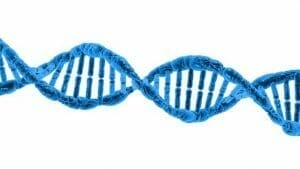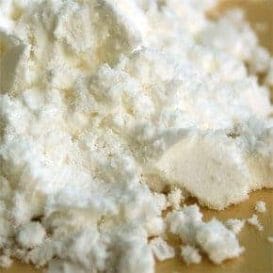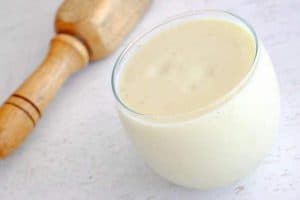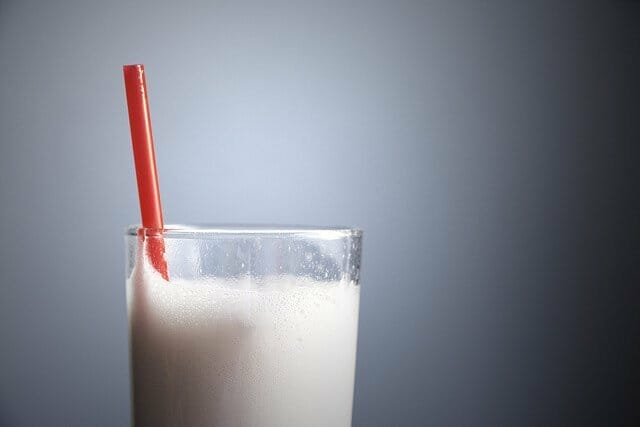Providing the body with an adequate amount of protein is one of the priorities for exercisers. Particularly those who are engaged in weight training and aiming to expand their musculature need to take care of the correct supply of proteins in their daily diet.ospis, because they are essential for the formation of new muscle fibers and the formation of lean muscle tissue. When training for mass, we should consume increased amounts of this macronutrient. And since diet alone is usually insufficient to fill such increased protein needs, it is worth reaching for protein supplements and nutrients. What are the most common types of protein? Which protein to choose?
Table of contents
Protein – an indispensable part of a healthy diet

Protein(protein) is one of the basic macronutrients, without which our body could not perform its functions. About 20% of the total body weight is protein. They take part in virtually all processes in the body.
Each protein molecule consists of amino acids, which are connected to each other by peptide bonds.
Among amino acids, we distinguish exogenous (essential) amino acids, i.e. those that the body cannot produce on its own and must be supplied with food, and endogenous amino acids, i.e. those that the body can synthesize.
What role does protein play in our body and why is it so important?
Proteins, fats and carbohydrates are three key nutrients necessary for the growth and development of the body and necessary for maintaining the proper functioning of all systems and organs. While carbohydrates and fats mainly take care of providing energy to tissues, protein is primarily a building block.
Proteins are found in skin, hair, body fluids, blood vessels, muscles, joints, tendons, cartilage, internal organs, glands. In all tissues and cells of our body, protein plays a critical role.
The main functions of proteins in the body:
- build all the cells of our body,
- take care of maintaining the proper structure of tissues and organs,
- ensure proper stability of organs and tissues,
- enable cells of the same type to adhere to each other,
- transport oxygen, iron, carbon dioxide, vitamins and other substances between cells,
- are responsible for the regeneration process of cells and tissues,
- are responsible for the body’s immunity, defend us from pathogens,
- perform the role of hormones, by which they regulate the work of organs and control numerous processes in the body,
- fulfilling the role of neurotransmitters, are responsible for the transmission of nerve impulses,
- take care of the proper course of biochemical reactions,
- enable cells and tissues to move,
- take care of the proper reaction of body fluids,
- store molecules of chemical compounds,
- control the level of metabolites in cells,
- receive and transmit information between cells.
Protein requirements
Protein requirements can vary depending on factors such as:
- age (in infants, children, adolescents, adults, the elderly, protein requirements vary),
- activity level (for physically active people, protein requirements are higher),
- physiological state (pregnant and lactating women have higher protein requirements),
- the condition of the body (depending on whether the person is healthy, suffers from some disease, undergoes hormonal fluctuations, is in recovery, etc.).
For an adult , the protein requirement is about 0.9 g for each kilogram of body weight. Special requirements in terms of dietary protein content have people who exercise. Depending on the type of training and what our current training goal is, protein requirements can vary.
How much protein per day for a person who trains?
People who train regularly should make sure to increase the amount of protein in their diet for several reasons. First of all, because proteins guard optimal muscle performance (they take part in muscle contractions, enabling muscle movement). They are also a guarantor of efficient and fast muscle recovery after exercise, faster recovery and less risk of overtraining. What’s more, proteins are the bricks from which new muscle fibers are created, so if you want to tone and expand your muscles, you need to supply them with adequate amounts of raw material.
Depending on the discipline and type of training, the requirement for exercisers oscillates around 1.2 g – 2.2 g for each kilogram of body weight.
In endurance sports, about 1.2 – 1.6 g of protein per day per kilogram of body weight is recommended. Meanwhile, in strength sports, about 2 g of protein per day per kilogram of body weight is recommended.
How much protein for fat reduction?
Consuming large amounts of protein is doubly important for people training for reduction. First, protein improves muscle function, helping us to achieve higher training efficiency, and the more efficient the training, the faster the elimination of excess weight. Secondly, a high supply of protein in the diet makes the metabolism speed up, calories are burned faster, and thus fat disappears from our body sooner. Consuming protein products also makes it easier for us to keep our appetite in check, which also translates into effective fat reduction.
When training for reduction, it is recommended to consume about 1.5 g – 2 g for each kilogram of body weight.
How much protein for mass?
Consuming protein in increased amounts will speed up the process of muscle expansion and improve muscle recovery. What’s more, during the period of building muscle mass and strenuous training, increasing the supply of protein will also protect us from the phenomenon hated by gym-goers, which is the breakdown of muscle tissue caused by intense exercise.
For those training for muscle mass, the daily amount of protein intake should fluctuate between 1.8 g and 2.2 g per kilogram of body weight. The exact amount should be selected individually. It is advisable to start with smaller amounts (e.g. 1.8 g), and if the results are lacking or too slow, increase the protein supply. You should certainly not overdo it. Too much protein in the diet can reflect badly on our well-being, cause digestive complaints, kidney problems and other health problems.
What are the sources of protein in food?
What is the easiest way to increase protein intake? By including in the daily menu products rich in this component, such as:
- lean meat,
- fish,
- eggs,
- seafood,
- milk,
- cottage cheeses,
- yogurts, buttermilk, kefir,
- legumes ( e.g., soybeans, beans, lentils),
- soy products (e.g., tofu, tempeh),
- seeds and seeds,
- nuts,
- groats, quinoa, amaranth,
- protein shakes from a blender (e.g., with milk, country cheese and seeds chia).
Protein – an important component of workout supplementation

Including protein-rich foods in the menu is not enough for many exercisers to provide the optimal amount of this macronutrient. That is why we also very often reach for ready-made protein supplements. This is a very good solution for many reasons, not only for training, but also for practical reasons.
Protein conditioner – what does it give?
In intensive training cycles it is worthwhile to support ourselves with protein nutrients, because:
- thanks to them we can save the time we would have to spend composing protein-rich menus and preparing protein meals,
- are a quick and easy way to supplement protein before and after training,
- are a provider of high-quality protein, distinguished by good assimilation by the body, and thus high efficiency,
- are a good way to satisfy hunger for a while, they work well, among other things. are a good method of satisfying hunger for a while, they work well, among others, at times when we do not have the opportunity to eat a normal, valuable meal (then they protect us from reaching for high-calorie, unhealthy snacks and the growth of unwanted body fat),
- provide support for the immune system,
- in addition to well-absorbed protein, often contain other ingredients that help build muscle mass or reduce fat, providing comprehensive support for the trainee,
- stimulate the growth of muscle mass,
- have a positive effect on overall training capacity, increase muscle strength and endurance,
- accelerate the recovery process, provide protection against sourness, strain, exhaustion, thus helping to maintain good form and carry out training plans in an uninterrupted manner.
Which protein to choose?
To choose the best possible protein, it is worth considering not only the composition of the nutrient, but also individual training goals. A different protein will be the best solution for fat reduction, another for building mass, still another for sculpting or general training, focused on improving fitness, conditioning and increasing physical strength.
Which protein for reduction?
Protein supplements are highly recommended in a reduction cycle and can accelerate body slimming. They have a thermogenic effect, turn up the metabolism and make our body use more energy (making fat burning more intense). In addition, they satiate well and suppress appetite, so they also promote weight loss. By providing important amino acids, they also support our muscles, so we can train more dynamically and productively.
When reducing, it’s worth reaching for nutrients with as few carbohydrate and fat additives as possible, and as many highly concentrated proteins as possible. The best choice here will be milk proteins, especially whey protein. Most often recommended in cycles for reduction is whey protein concentrate, but whey protein isolate or whey protein hydrolysate will also be a very good option. Also, plant protein will do the job in a cycle for reduction if we do not want to use animal protein. In addition, we can also reach for branched-chain amino acids (BCAA).
What kind of protein for mass?
A good protein for mass is one that will give us quick and clear results in the growth of muscle tissue, and at the same time one that will improveat the same time one that will improve muscle strength, counteract catabolism and facilitate recovery. WPC protein, WPI protein and WPH protein, i.e. whey protein concentrate, isolate and hydrolysate, in turn, are very popular among exercisers. But a combination of concentrate and isolate has also been growing in popularity recently. Micellar casein, egg whites, vegetable proteins, gainers will also give us good results.
Best nutrients for mass
Whey protein

Preparations built on whey protein have enjoyed unflagging popularity for many years. They are by far the most widely used protein nutrients, whether you’re training for mass, sculpture, reduction or to stay in shape.
Whey protein is derived from whey, the liquid byproduct of making cheese from milk. Protein derived from whey is distinguished by its high bioavailability and good absorption by the body. It has a very favorable amino acid profile, abundant in valuable essential amino acids (including BCAA amino acids).
Whey proteins are available in the form of hydrolysate (the fastest absorbed, with the highest protein content, but also the most expensive), isolate (very quickly absorbed, also with a highalso with high protein content, slightly cheaper than hydrolysate), and concentrate (cheapest, but also slightly slower absorbed, with lower protein content here).
Egg protein
Egg protein supplements among various supplements for muscle mass have recently become increasingly popular. They are absorbed more slowly than whey protein, so they are especially recommended in the evening, as an antidote to nocturnal catabolism. A certain advantage of egg nutrients over whey nutrients is the fact that in addition to valuable proteins, rich in numerous amino acids, you can find in them many vitamins and minerals naturally found in eggs. Therefore, if you are looking for a mass nutrient that will provide not only a portion of complete protein, but also other important nutrients, egg protein-based supplements will be a good option.
Casein protein
Casein supplements are based on milk proteins (casein) and are characterized by high biological activity. In their composition you can find lactose, so they are not suitable for people who are allergic to this ingredient.
Casein nutrients contain complete protein, at the same time they are characterized by slow absorption, so they are rather unsuitable as a post-workout nutrient. However, they perform very well as a nutrient that minimizes catabolism at night, so it is worth reaching for this type of product in the evening.
Soy protein
If you are looking for a weight gainer that does not contain animal protein, soy protein will be a good choice. Soy nutrients have a slightly lower value and lower digestibility than, for example, whey nutrients. whey nutrients, but on the other hand, they contain the entire set of essential amino acids, so they can be a good alternative to other types of nutrients. Soy protein-based supplements are often chosen by vegetarians, vegans and people who cannot tolerate animal protein preparations.

